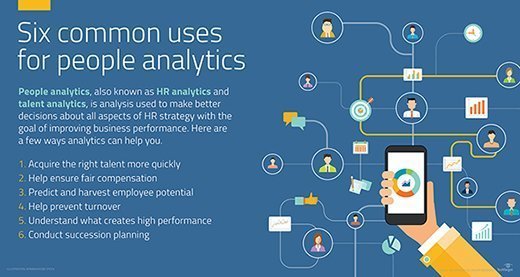
AI for recruiting helps companies land top job candidates
More enterprises are using AI in hiring today, a practice that can help surface strong applicants. But there are several pitfalls businesses need to watch for.
Many fret that AI could impact the labor force by taking jobs away from humans, but there's one task that few might suspect could go the way of the bot: the job interview itself.
Increasingly, companies are looking to artificial intelligence to help to find, develop and retain their human personnel. While it might sound counterintuitive in some ways, AI for recruiting offers significant advantages over humans when it comes to making sure that the right people are performing the right jobs for the organization.
One of the biggest challenges that companies face is filtering through large amounts of resumes, online job profiles and inbound inquiries. In especially high-turnover industries, such as retail, warehouse logistics and food services, companies face significant challenges when managing the hiring process. This tedious task often falls on the shoulders of overtaxed management to filter through, contact and interview a large pool of job candidates.
Automating the candidate search process
Emerging AI technology companies are using machine learning and other AI methods to automatically peruse online job boards, analyze resumes and filter email communications from applicants. These systems are capable of sorting and analyzing almost limitless numbers of resumes and responding automatically to those that are clearly not a fit for the organization, while also sorting the best candidates to the top of the pile.
Some of the more advanced AI-based systems create profiles of existing, high-performing employees in particular positions and search for candidates that have similar profiles.
These AI-enabled tools can access a much wider range of databases and candidate sources than their human counterparts can, allowing organizations to identify candidates that could be missed using traditional methods. AI bots can give hiring organizations more information about candidates by finding their social media and other online activities and highlighting items that might be of interest or concern to a prospective employer.
Companies are also using AI-based systems to create and manage online job postings. Rather than creating a single general posting to be used on multiple sites, AI systems can create hundreds of different job postings customized for different platforms and handle the responses for each job site in different ways. Using predictive analytics, these systems can craft the perfect job ad that optimizes for the specifics of the position, location, skill set and more. Once positions are filled, these bots can remove the postings and replace them with new ones.

By using machine learning algorithms that are trained to look for the skills, education and work experience that match job requirements, companies can avoid many of the bias-related problems that plague human-driven hiring decisions. AI systems are able to select a more diverse candidate pool and avoid biases that stem from hiring managers looking within their own immediate networks to find candidates for positions.
Of course, machine learning systems are only as good as their training data, so companies that leverage AI for recruiting must make sure that they don't train their systems using biased data.
Improving the interview and hiring process
Once these systems have found the best candidates and their human counterparts have helped further whittle down the candidates, AI systems can step in again to make the candidate evaluation process more efficient.
AI chatbots directly engage with candidates to schedule interview times and ask standard interview questions prior to any meeting with company management. The AI system can then rank and score the candidates based on those standard questions in order to further help employers with the process.
Chatbots can also help answer candidate questions on specifics of the job, such as standard company hours, company information or other matters. Candidates can now have their questions answered at any hour of the day, and hiring managers don't have to get bogged down with responding to multiple inquiries.
More striking is the use of AI technology to handle video-based interviews with job candidates. An increasing number of startup companies are applying facial recognition technology and other methods to perform online video screening of job candidates, usually as a first step in screening them. However, while this approach offers many advantages from the perspective of efficiency and standardization, it also introduces the potential risk for bias when facial recognition models are inappropriately trained. That can lead to unfair treatment of female or minority candidates, for example.
The bias could manifest itself in qualified candidates not making it through to the next round of interviews because the system weighted mannerisms and emotional responses from men more favorably than those of women, or because the systems might lack training data sets that include minority faces, which can cause them to misread emotional or other signals. It is imperative that companies train any facial recognition system they wish to use as a part of an employment candidate screening process across a wide range of ages, genders, ethnic identities and other physical characteristics.
Candidates that pass the automated and bot-based portions of the hiring process are then handed off to humans who can do more of the emotional IQ and interpersonal assessment that machines are not yet capable of.
AI for recruiting can then help post-interview by asking follow-up questions, letting candidates know where they are in the hiring process and handling any further inquiries from the job-seeker.
The AI-enabled HR department is here now
After the hiring process is completed, AI systems can continue to provide value to organizations by handling employee onboarding, any required skill set testing and evaluation, and job performance measurement.
The labor landscape continues to get more challenging for employers with many regulatory compliance requirements and challenges related to health insurance, employee benefits, tracking of paid time off and other workforce requirements. In many of the same ways that AI platforms are helping to deal with these processes and information requirements in other industries, they are being applied to solve HR-specific problems.
Indeed, the future of the AI-enabled HR department is already here, as the application of intelligent assistants for the wide range of employee management tasks continues to expand. While many people are concerned that bots are here to take their jobs, it seems that for now, bots are here to help you find and keep the right one.








